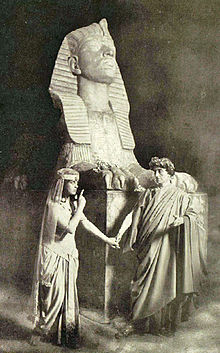Caesar and Cleopatra (play)
| Caesar and Cleopatra | |
|---|---|

Gertrude Elliott and Johnston Forbes-Robertson in Caesar and Cleopatra, New York, 1906
|
|
| Written by | George Bernard Shaw |
| Date premiered | 15 March 1899 |
| Place premiered | Theatre Royal, Newcastle upon Tyne |
| Original language | English |
| Subject | Julius Caesar meets Cleopatra |
| Genre | history play |
| Setting | Ancient Egypt |
Caesar and Cleopatra is a play written in 1898 by George Bernard Shaw that depicts a fictionalized account of the relationship between Julius Caesar and Cleopatra. It was first published with Captain Brassbound's Conversion and The Devil's Disciple in Shaw's 1901 collection Three Plays for Puritans. It was first performed in a single staged reading at Newcastle upon Tyne on 15 March 1899, to secure the copyright. The play was produced in New York in 1906 and in London at the Savoy Theatre in 1907.
The play has a prologue and an "Alternative to the Prologue". The prologue consists of the Egyptian god Ra addressing the audience directly, as if he could see them in the theater (i.e., breaking the fourth wall). He says that Pompey represents the old Rome and Caesar represents the new Rome. The gods favored Caesar, according to Ra, because he "lived the life they had given him boldly". Ra recounts the conflict between Caesar and Pompey, their battle at Pharsalia, and Pompey's eventual assassination in Egypt at the hands of Lucius Septimius.
In "An Alternative to the Prologue", the captain of Cleopatra's guard is warned that Caesar has landed and is invading Egypt. Cleopatra has been driven into Syria by her brother, Ptolemy, with whom she is vying for the Egyptian throne. The messenger warns that Caesar's conquest is inevitable and irresistible. A Nubian watchman flees to Cleopatra's palace and warns those inside that Caesar and his armies are less than an hour away. The guards, knowing of Caesar's weakness for women, plan to persuade him to proclaim Cleopatra—who may be controllable—Egypt's ruler instead of Ptolemy. They try to locate her, but are told by Cleopatra's nurse, Ftatateeta, that she has run away.
(The film version of the play, made in 1945, used the Alternative Prologue rather than the original one.)
...
Wikipedia
